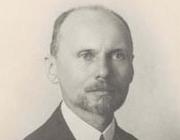
Born on 10 August 1875 in Săliște (Sibiu) – died in 1959, Sibiu. Professor, literary historian, journalist, honorary member of the Romanian Academy.
He donated to the library an entire archive that contained manuscripts, documentary materials, as well as a large correspondence with important historians and people of culture, such as I. Bianu, I. Breazu, O. Ghibu, V. Goldiş, I. Lupaş, I. Muşlea, S. Puşcariu, N. Iorga and many others.
He went to high school in Sibiu and in Brasov, and he graduated from the Faculty of Letters in Budapest. In 1898, after graduation, he returned to Transylvania, where he worked as a substitute teacher at the Andrei Saguna High School in Brasov. In 1903, he was named titular professor of the Department of the Romanian and Hungarian Languages, where he remained until 1916. The shift in his career and life was due to retreat of the Romanian army to Moldavia. He left the town together with the Romanian troops and he settled in Barlad, where was employed as a teacher at the Codreanu High School. Once the war broke out and throughout its duration, the high school was closed and as such he was compelled to find employment elsewhere. He managed to get a job at the Ministry of Instruction, at the secondary education department, and in the summer of 1917, he crossed the border to Basarabia. Here, he worked for a while as a Romanian language teacher for the Teacher Courses, at the Remezova Girls High School and he later moved to Chisinau, where he taught at the Bogdan Petriceicu Hasdeu High School. Once the war was over, he returned to Romania, where he was reinstated as a teacher at the Andrei Saguna High School in Brasov.
In 1919 he began his political career, having been co-opted, after the Union, as a member of the Great National Council. He stood out as a cultural initiator, as he actively contributed to the improvement of the social and cultural lives of the Romanians of Brasov.
In time, he carried out a fruitful journalistic career. As such, between 1929 and 1938, he was the editor of the magazine Țara Bârsei and a contributor to the magazines Transilvania, Gazeta Transilvaniei, Societatea de mâine, Familia, Tribuna, Românul (Arad), Dreptatea (Brașov) and Gând Românesc. These publications contain numerous articles, reviews and works of Axente Banciu, some signed in his own name, others under the pseudonyms S. Tamba or N. Hurlup.
In his attempt to make the Trasylvanian figures known, he often evoked the contributions made by important people, such as: George Bariț, Gheorghe Bogdan-Duică, Vasile Goldiș or Alexandru Bogdan. He contributed to the magazine Societatea de mâine, in the column “Din dicționarul greșelilor noastre de limbă și ortografie” (Out of the dictionary of our language and spelling errors). As attempt to cultivate the Romanian language and especially to avoid linguistic copies from Hungarian or German (which occurred quite often in Transylvania), the following works must be mentioned: Câteva spicuiri din dicționarul greșelilor noastre de limbă (A few extracts from the dictionary of our language errors), Cum vorbim și cum ar trebui să vorbim românește (1913) (How we speak and how we should speak Romanian).
He published a volume of poems entitled Iluzie și realitate (1940) (Illusion and reality), but he also published translations from the Hungarian literature, especially from Petofi Sandor, whose translated poems he published in the magazines Gazeta Transilvaniei, Convorbiri Literare and Țara Bârsei.
Axente Banciu was a highly appreciated and respected figure by his contemporaries. For his merits, he was awarded the orders of the Romanian Crown (1923) and the Romanian Star (1930). The Romanian Academy honoured him in 1948 by naming him an honorary member. He died in Sibiu on 13 August 1959.


